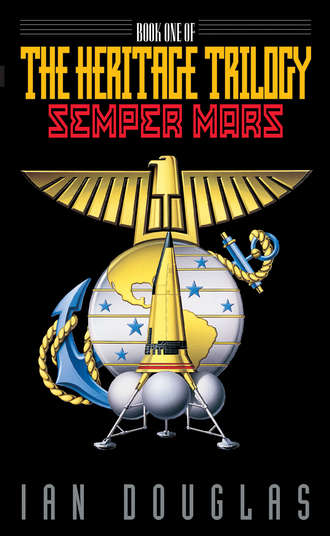
Полная версия
Semper Mars
Lloyd found a convenient stanchion and hung on, floating in an out-of-the-way attitude as the rest of the Marines filed in. Overall, the evolution was an orderly one…but he noticed one bit of confusion toward the rear of the column.
Pushing off from his anchor point, he maneuvered to the scene of the problem. An unarmored civilian had infiltrated the column and had gotten tangled with the armored troops.
It was one of the archeologists, Dr. David Alexander.
“Can I help you, sir?”
“Uh…I thought I would tag along on this shuttle,” Alexander replied. “I understand you’re going straight to Cydonia, instead of to Mars Prime.”
The only thing faster than light is the damned shipboard scuttlebutt, Lloyd thought. “I’m not sure that’s such a good idea,” he replied. “This is liable to be a rough ride, with a hot reception at the end of it.”
“Well, Captain Elliott said there was room.”
“Captain Elliott?”
“Harper Elliott. Bizarre’s skipper. Turns out she used to be a Navy aviator. Served on the Reagan, same ship as my dad.”
“I see.” That put Lloyd in an uncomfortable position. He didn’t want to have civilians kicking around on his assault boat, especially if things turned nasty when they hit ground. On the other hand, it wasn’t his assault boat, not in the formal sense. Elliott was ship’s captain, and he didn’t want to end up second-guessing the Bizarre’s CO.
Alexander seemed to sense Lloyd’s dilemma and gave him a lopsided grin. “I’ll promise to be good.”
He sighed. “Very well, Dr. Alexander,” Lloyd told the man. There ought to be room enough. “Find yourself a seat. But…if things are hot when we touch down, you get the hell out of the way, understand?”
“You expect things to be, uh, ‘hot,’ as you put it?”
“I don’t expect anything, sir. But it’s best to be prepared.”
“Don’t worry,” Alexander said. “If anybody starts shooting, I’ll be sure to keep my head down.” The man spoke with a sardonic edge to his voice that told Lloyd he was being humored.
Colonel Lloyd did not like being humored, and he did not like the archaeologist’s attitude, at once bantering and condescending. He almost—almost—wished that something would happen when they landed, just to teach the arrogant civilian some manners.
Not, he realized, a professional response at all.
1556 GMT
Mars Shuttle-Lander Harper’s
Bizarre
Sol 5621: 1210 hours MMT
David Alexander had fought to get himself a window seat.
Not that there was terribly much to see through the narrow, thick-cut piece of grit-scoured transplas set in the circular port, but he felt he deserved a chance to see the Cydonian site from the air. The Marines, after all, didn’t need to see the area they’d be guarding. It was just another deployment to them.
And besides, he wanted to see the Face.
He chuckled to himself. If Hoist or that bureaucratic idiot Bahir at the Egyptian Ministry of Antiquities could just see him now….
For a time, all he’d seen through the tiny port was the slowly revolving arms of the cycler as Marines continued to load their gear aboard Harper’s Bizarre. Finally, though, with a short, hard shock, the MSL had cut free from the cycler, falling tail first away from the far larger spacecraft-station until Alexander, by pressing his face hard against the transplas and shielding it from the interior light with his hands, could see the cycler in its entirety. Two more MSLs were in the process of docking with the cycler as the Bizarre cleared the sweep of Polyakov’s arms. Then, with a gut-wrenching burst of acceleration, Bizarre spun to a new attitude that swept the other spacecraft from view.
Acceleration pressed him back against his thinly padded couch…building and building far beyond the meager three-tenths G he’d gotten used to over the past few weeks. He wasn’t sure how long they were under boost; he’d forgotten to check his wrist-top when the Bizarre’s nukes cut in. He only knew that the weight pressing down on his body, on his chest and lungs, was unendurable…and that it went on and on and on, forcing him to endure, whatever he thought about the matter.
Eventually, they were in free fall again, but by that time he felt too tired to note the time…or even to look out the window.
After a while, acceleration resumed, and the sky beyond his tiny porthole began to glow.
The point of cycler spacecraft like Polyakov was that they occupied solar orbits that touched Earth’s orbit on their inward swing and Mars’s orbit on their outer. With some judicious use of gravity wells during each planetary swing-by and occasional kicks from their ion-electric drives, they could arrange to meet the planetary orbits when the planets themselves were there. It was necessary, however, to ferry the personnel and equipment brought out from Earth down to the Martian surface…and that meant a hefty delta-v burn, followed by aerobraking in the Martian atmosphere. The ride down was long, rough, and excruciatingly uncomfortable.
Alexander spent much of reentry trying hard not to be sick.
“Hey, uh…sir?” the Marine seated next to him said after a long time. “You see anything out there?”
Vaguely, Alexander realized that the man talking to him was the Marine he’d shouldered aside earlier in order to get the spot by the window. The name FULBERT was stenciled in black on the gray-and-white mottling of his chest armor. “Not a lot,” he said.
Several more jolts slammed him in the back as Bizarre’s nuclear engines came up to full thrust. The shuttle was balancing down on its tail now. “Down” was aft, toward the rear of the ship, and Alexander was lying flat on his back with his knees braced above his chest.
“You’re the new head archeologist gonna see the Face, right?” Fulbert said.
Alexander shook his head. He’d not associated much with the Marines for the past months, understandably enough, and his official mission had not been widely advertised, but it was impossible to live that long inside a couple of large, sealed tin cans without everyone learning something about everyone else.
“I’m just going with some new sonic imaging gear,” he said, correcting the Marine. “Dr. Graves is head of the American team, and he’s already at Cydonia. Dr. Joubert is going as head of the UN team, though.”
Fulbert’s face split into a broad and knowing grin inside the confines of his open helmet. “Man, there’s a high-voltage outlet! I guess you two don’t let the international shit get in the way of your workin’ together, huh?”
Clearly, Fulbert was more interested in the salacious details of his relationship with Joubert than in the international situation. “She’s a good archeologist,” he replied, keeping his voice noncommittal. “She did some fine fieldwork in the Yucatán.”
“Ha! I wouldn’t mind doin’ some fieldwork with her. Is that where you met her? Down in Yucatán?”
Alexander shook his head. “My specialty is…my specialty was Egypt.” He found that the unfairness still hurt, even after three years. “In a way, I guess, we’re enemies.” He gave a wan smile. “Some folks with the UN don’t care much for me or my ideas.”
The Marine’s eyes widened. “Egypt? You mean like, the pyramids and the Sphinx and all that?”
“That’s right.”
“So…you think there’s some kind of connection? Between the Sphinx and the Face? Is that why you’re on the UN’s shit list?”
Alexander grimaced. The question always came up with the uninitiated. “The Sphinx at Giza and the Face at Cydonia have nothing, nothing whatsoever to do with one another.” He’d long since lost count of how many times he’d gone through this. “The Face, as near as we can tell, is something like five hundred thousand years old. That’s half a million years, okay? The Sphinx, I am convinced, is much, much older than the date traditionally assigned to it, but it is nowhere near that old. The idea that the same culture who made the Face also made the pyramids and the Sphinx is garbage…worse than trying to link the pyramids of Egypt with the pyramids of Mexico. Can’t be done.”
“Yeah? But I read that the UN was havin’ to call out troops to break up demonstrations…and lots of those demonstrations were over the idea of aliens colonizing the Earth thousands of years ago. Things like the Sphinx are supposed to be proof the aliens were here, but the UN government doesn’t like that.”
Alexander sighed. As was often the case, the layman’s view mingled a little fact with a great deal of fancy. “There were definitely aliens in the solar system half a million years ago,” he explained. “They left traces at Cydonia…though you might be surprised to hear that there are still quite a few scientists who argue that the Face and the so-called pyramids on Mars are natural features.”
“No shit?”
“Most of us think the Face, at least, was carved by someone…something, and the Fortress-Ship complex is obviously artificial, though after half a million years of dust storms and weathering, there’s not much left of it. But there is room for debate. That’s what science is all about, after all, testing hypotheses.”
“How come some scientists still think that Face-thing is natural? I’ve seen three-vids of that thing, and it gives me the crawlies.”
“Well, we still can’t find a decent reason for a sculpture of an essentially human face to be carved into a mesa on Mars at a time when Homo sapiens was just appearing on Earth. The aliens, whoever or whatever they were, were not human. I guess it’s easier to believe that the Face is a wind-carved freak of nature than it is to believe it could be a deliberately sculpted likeness of us.”
“Well, that’s what all the nutcase new religions and shit are all about, ain’t it? That the aliens tinkered with apes and turned ’em into people? Like in that old movie that everybody’s talkin’ about now, 2000.”
“2001: A Space Odyssey,” he said, correcting the Marine again. “And it wouldn’t have been apes, not unless you count humans as a kind of ape. Homo erectus was the dominant hominid line on Earth half a million years ago.”
“Sure, whatever. But, like I was sayin’, everybody on Earth, it seems like, either thinks the aliens were gods or thinks that we’re tryin’ to slip one over on ’em to take away their religion, or whatever, and the UN johnnies all seem dead sure that all the stuff about aliens visiting Earth back then is crap. Like it couldn’t possibly happen, y’know?”
Alexander smiled. “I know.” He’d been in the eye of that particular storm for a long time. In fact, he had his own opinions about some of the more improbable sites on Earth…not that aliens had built them, necessarily, but the possibility of alien inspiration and technical help was not unthinkable.
Still, it was dangerous territory to tread upon. The discoveries of the past few decades had transformed traditional science…but they’d also caused an explosion in the pseudosciences. The old “ancient astronaut” theories had come back with a vengeance, spawning volume upon volume of crackpot ramblings, pop-science gibberish, and even a horde of new religions.
Hoping to end the conversation, he deliberately checked his wrist-top, calling up the time. Before the MSL rendezvous, everyone’s personal computers had been updated to Mars time. The planet’s rotation was slightly longer than Earth’s and, therefore, could not be brought into synch with the GMT used aboard all spacecraft. A Martian day was called a sol; it was divided into traditional hours and minutes, as on Earth, but had an extra thirty-seven-minute catch-up period, called soltime, added after local midnight. The young Mars colony counted sols instead of days, beginning with the official establishment of the first permanently manned settlement—the base at Candor Chasma, now known as Mars Prime. Sol 1 was July 20, 2024, fifty-five years to the day after Armstrong had set foot on the moon. The current sol was 5621.
All of which meant that Mars Mean Time, or MMT, had nothing whatsoever in common with GMT. It was now, he saw, 1740 hours at Cydonia—late afternoon—and 2126 hours in Greenwich. Of course, for the next fifteen months or so, his only interest in what time…or day…it was on Earth would be when he had to calculate the arrival or departure time of another report.
“So,” Fulbert said, still clinging to the conversation thread, “you don’t think aliens did stuff on Earth? You know, the pyramids? Easter Island? All that shit?”
He decided not to mention his own reservations about the Giza pyramids, at least. “Easter Island? Certainly not! We know how the local population built and raised those great stone heads, because they showed us. No mystery there at all.”
Turning away in another attempt to end the conversation, he pressed his face against the tiny port. He could see sky above—still a dark, purplish color at the horizon turning to jet-black overhead. Below, the Martian surface spread out beneath a curved horizon, a dusty, dusky ocher color tinted with streaks of rust and gray-brown. They were still too high up for the smaller details of the surface to be visible, but he could see scattered, shadow-edged shapes that must be mountains or the jumble of chaotic terrain. He tried to orient himself. If it was late afternoon here, then north would be that way…but he didn’t know if they were even descending in an attitude that would let him see the Face or the attendant structures. It was frustratingly like trying to recognize buildings or landmarks from the air while approaching a city’s airport on Earth. For all he knew, the Cydonian ruins were on the other side of the—
He saw it.
My God! It’s just like they all said…but so…so unexpected….
It was smaller than he’d thought it would be, which was why he’d overlooked it at first. Bizarre must still be twenty or thirty kilometers up. He looked down on the Cydonian Face, and it returned his wondering stare with the same enigmatic and Sphinx-like skyward gaze it had worn for half a million years.
First captured by chance on two frames shot by the Viking 1 orbiter spacecraft in 1976, the Face hadn’t even been noticed until the early 1980s…and then the image had been dismissed as a trick of the light and of the remarkable persistence of the human mind in imposing order and facial features on random shapes, be they ink-blots on a paper, or a mile-long landform in the desert. By the turn of the century, space probes had returned better images, and NASA had—with some reluctance—acknowledged at last that there might be something there worth investigating after all. That revelation, that intelligence had carved a mile-long face into a mesa in the Cydonian region of Mars, was the last in a rapid-fire barrage of discoveries that had completed at last the long-fought Copernican Revolution. Since the 1990s, it had been known that planet-bearing stars were common, and evidence of fossilized bacteria had been discovered on a meteorite gouged from the Martian surface eons before.
Humankind was not alone in the universe.
Those discoveries had spurred a long-awaited renaissance in space exploration. The first manned landing on Mars, a joint US-Russian venture, had taken place in 2019 at Candor Chasma; it wasn’t until the second landing five years later that Geoffrey Cox, Anatol Kryukov, and Roberta Anders had stood at last in the shadow of that alien-carved enigma and wondered….
Конец ознакомительного фрагмента.
Текст предоставлен ООО «ЛитРес».
Прочитайте эту книгу целиком, купив полную легальную версию на ЛитРес.
Безопасно оплатить книгу можно банковской картой Visa, MasterCard, Maestro, со счета мобильного телефона, с платежного терминала, в салоне МТС или Связной, через PayPal, WebMoney, Яндекс.Деньги, QIWI Кошелек, бонусными картами или другим удобным Вам способом.









